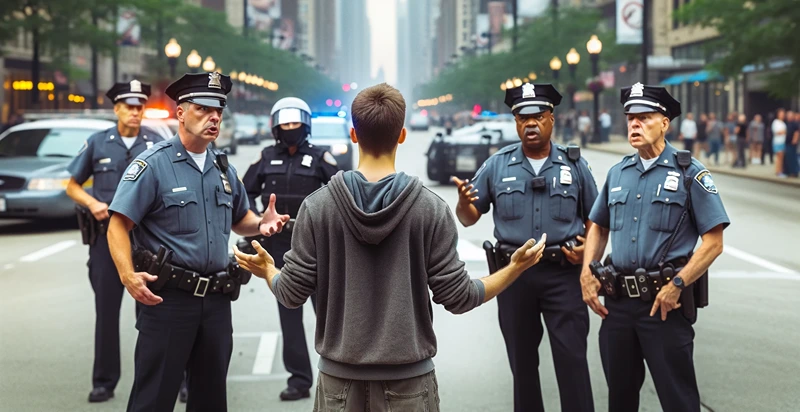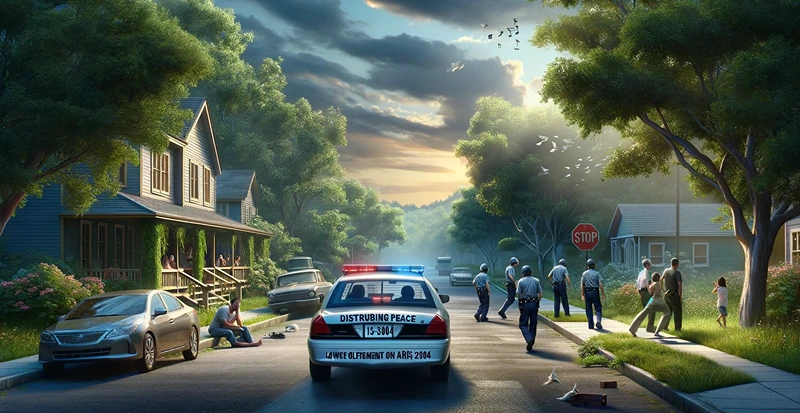Disorderly Conduct Law in Arizona: ARS 13-2904

This article discusses the following:
- What is Disorderly Conduct in Arizona: ARS 13-2904
- What Does Disturbing the Peace Mean
- Is Cursing Considered Disorderly Conduct?
- Drunk and Disorderly Charges
- Is Domestic Violence Considered Disorderly Conduct?
- What are the Penalties for Disorderly Conduct
- What are the Defenses For Disorderly Conduct
- Frequently Asked Questions
- How An Arizona Criminal Defense Attorney Can Help
Under ARS 13-2904, disorderly conduct encompasses a wide range of behaviors, including fighting, making unreasonable noise, using abusive language, and creating a hazardous or threatening condition.
This law also prohibits the discharge of a deadly weapon or dangerous instrument in a public place.
If you have been charged with disorderly conduct, seeking legal representation from a skilled criminal defense lawyer is essential. Kolsrud Law Offices offers a free initial consultation to discuss your case and provide insight into your legal options.
Contact us today to schedule a
FREE CONSULTATION and learn
how we can help you.
What is Disorderly Conduct in Arizona: ARS 13-2904
ARS 13-2904 is the statute under Arizona law that defines and governs the offense of disorderly conduct. It outlines specific behaviors that are considered unlawful due to their disruptive nature to public peace and order.
Key aspects of this statute include:
Prohibition of Conduct: It criminalizes actions that intentionally or knowingly disturb the peace or quiet of neighborhoods, families, or persons.
Types of Prohibited Behavior:
➣Engaging in fighting, violent, or seriously disruptive behavior.
➣Making unreasonable noise.
➣Using abusive or offensive language or gestures that are likely to provoke immediate physical retaliation from another.
➣Making any protracted commotion, utterance, display, or gesture that prevents the lawful use of property or is intended to do so.
➣Disturbing any lawful assembly or meeting of persons without lawful authority.
➣Obstructing vehicular or pedestrian traffic, or the lawful use of property by others, without legal privilege to do so.
➣Recklessly handling, displaying, or discharging a firearm or deadly weapon.

What Does Disturbing the Peace Mean
Disturbing the peace, within the context of ARS 13-2904, refers to any conduct that significantly disrupts the tranquility of the community or public space.
This can include excessively loud noises, brawls in public places, or any behavior that interrupts the peace, comfort, or decorum of those present.

Is Cursing Considered Disorderly Conduct?
In Arizona, whether cursing constitutes disorderly conduct under ARS 13-2904 largely depends on context, intent, and setting.
The statute does not categorically criminalize cursing; however, it becomes relevant to disorderly conduct when used in a manner that intentionally or knowingly disturbs the peace.
Specifically, language that is abusive or likely to provoke an immediate physical response falls under scrutiny. The distinction between public and private settings also plays a role, as public instances of cursing that disrupt the communal peace are more likely to be considered disorderly conduct.
Nonetheless, any enforcement of disorderly conduct laws must carefully consider First Amendment protections, ensuring that the cursing does not amount to protected speech. The determination is made on a case-by-case basis, assessing the intent behind the language and its potential to incite disturbances.

Drunk and Disorderly Charges
Drunk and disorderly charges often occur when an individual's alcohol-influenced behavior disrupts public peace, such as engaging in loud arguments, causing excessive noise, obstructing traffic, or exhibiting provocative behavior in public spaces.
Defending against these charges can involve strategies like arguing the lack of intent to disturb the peace, demonstrating that the behavior did not significantly disrupt public order, claiming self-defense, asserting First Amendment rights if applicable, or challenging the sufficiency of evidence provided by the prosecution.

Is Domestic Violence Considered Disorderly Conduct?
In Arizona, domestic violence is addressed under specific statutes, yet behaviors associated with domestic incidents can overlap with disorderly conduct as defined by ARS 13-2904.
This statute specifies that a person commits disorderly conduct if they intentionally or knowingly disturb the peace or quiet of a neighborhood, family, or person through disruptive behaviors.
Such actions can include loud arguments or physical altercations in a domestic setting that extend beyond the private sphere and disrupt public order.
What are the Penalties for Disorderly Conduct
The penalties for disorderly conduct in Arizona vary depending on the specifics of the offense, including whether it involved a firearm and the defendant's criminal history.
Here is an overview of the potential legal consequences:
Class 1 Misdemeanor:
-
- For general disorderly conduct cases without aggravating factors.
- Up to 6 months in jail.
- Fines of up to $2,500, plus surcharges.
- Probation for up to 3 years.
- Community service may be ordered.
Class 6 Felony:
-
- If the disorderly conduct involved a firearm or deadly weapon.
- Potential for more severe penalties, including prison time.
- Increased fines and longer probation periods.
- Possible loss of the right to own or possess firearms.
Additional Consequences:
-
- A criminal record, which can affect employment, housing, and educational opportunities.
- Mandatory anger management classes or other behavioral counseling.
- Restraining orders, especially if the disorderly conduct was related to domestic disputes.
- Increased penalties for repeat offenses or if committed in the presence of a minor.
It's important to note that the exact penalties can be influenced by a range of factors, including the presence of mitigating circumstances, the defendant's prior criminal history, and the effectiveness of the defense strategy employed.
An experienced criminal defense attorney can provide guidance on the likely penalties in a specific case and may be able to negotiate reduced charges or penalties.

What are the Defenses For Disorderly Conduct
In addressing disorderly conduct charges under Arizona law, a variety of defenses can be strategically employed to challenge the prosecution's case. These defenses are tailored to the specifics of the alleged conduct and the circumstances surrounding the incident.
Here are some of the most commonly used defenses for disorderly conduct:
Lack of Intent
Demonstrating that the defendant did not intend to disturb the peace or was not aware that their behavior could be considered disruptive. The law requires intentional or knowing disruption of peace, so proving a lack of intent can be a powerful defense.
First Amendment Rights
Arguing that the defendant's actions were protected under the First Amendment to the United States Constitution, especially if the case involves speech. This defense can be complex, as it must balance the right to free speech against actions that genuinely disturb the peace.
Self-Defense or Defense of Others
If the disorderly conduct arose from a situation where the defendant was protecting themselves or others from harm, this defense might be applicable. Demonstrating a reasonable belief in the need for self-defense can challenge the basis for the charges.
.
Insufficient Evidence
- Challenging the prosecution's evidence as insufficient to prove beyond a reasonable doubt that the defendant's actions met the legal definition of disorderly conduct. This might involve questioning the reliability of witness testimony or the interpretation of the defendant's actions.
- Challenging the prosecution's evidence as insufficient to prove beyond a reasonable doubt that the defendant's actions met the legal definition of disorderly conduct. This might involve questioning the reliability of witness testimony or the interpretation of the defendant's actions.
Misidentification
Arguing that the defendant was not the person responsible for the disorderly conduct. This defense applies in cases where there is confusion or doubt about who committed the alleged actions.
Necessity
Claiming that the defendant's actions were necessary under the circumstances, and there was no better or legal alternative available at the time. This defense is less common but might be relevant in specific scenarios.
Employing these defenses effectively requires a deep understanding of both the law and the specifics of the case. A skilled criminal defense attorney can evaluate the circumstances, advise on the best defense strategy, and advocate for the defendant's rights throughout the legal process.
The goal is always to achieve the best possible outcome, whether that means a dismissal of charges, acquittal, or minimizing the penalties if conviction seems likely.
Frequently Asked Questions
Q: Can I be charged with disorderly conduct for refusing to obey a lawful order to disperse?
A: Yes, under Arizona law, refusing to obey a lawful order to disperse, especially if issued to maintain public safety in dangerous proximity to a fire or other emergency, can result in being charged with disorderly conduct. This action is seen as an intent to disturb the peace and can lead to legal consequences.
Q: Is there a difference between being charged with misdemeanor disorderly conduct and felony disorderly conduct in Arizona?
A: Yes, there is a significant difference. Misdemeanor disorderly conduct is less severe and usually involves actions like making unreasonable noise or engaging in a fight without a deadly weapon. Felony disorderly conduct, on the other hand, typically involves more dangerous behaviors, such as displaying a deadly weapon or dangerous instrument with the intent to disturb the peace. The penalties for a felony conviction are more severe than for a misdemeanor.
Q: What should I do if I'm arrested on charges of disorderly conduct in Arizona?
A: If you're arrested on charges of disorderly conduct, it's crucial to contact a disorderly conduct attorney immediately. An experienced law firm can provide legal advice, help you understand your rights, and work to defend you against the charges. It's important not to discuss your case with anyone else until you have legal representation.
Q: How does Arizona’s disorderly conduct law define the "quiet of a neighborhood"?
A: Arizona’s disorderly conduct law defines disturbing the "quiet of a neighborhood" as any action that intentionally or recklessly disrupts the peace or tranquility of the residents or people in the area. This can include loud noises, fights, or other disruptive behaviors that affect the community's comfort.
Q: What are the potential consequences of a disorderly conduct conviction in Arizona?
A: The consequences of a disorderly conduct conviction can vary, ranging from fines and community service to probation or jail time, depending on whether the charge is a misdemeanor or felony. A conviction can also impact one’s employment opportunities, housing options, and more, underscoring the importance of having a skilled disorderly conduct lawyer for your defense.
How An Arizona Criminal Defense Attorney Can Help
Josh Kolsrud, an esteemed Arizona federal crimes attorney, has an impressive track record that speaks to his expertise and dedication in the field of criminal defense. With over 3,500 cases and more than 100 jury trials under his belt, Kolsrud's experience is a testament to his skillful approach to legal defense, particularly in cases of disorderly conduct.
In cases of disorderly conduct, a criminal defense attorney like Kolsrud can offer critical support by challenging the evidence presented, arguing against the supposed intent to disturb the peace, and negotiating to reduce or dismiss charges.
Kolsrud Law Offices also provides a free initial consultation, allowing families to discuss their situation without financial commitment. To discuss your case, and explore your options. Give us a call at 602) 638-3790.
An award-winning criminal defense attorney Since 2006
Why Choose Josh Kolsrud
With over 100 jury trials to his name, and years of experience as a state and federal prosecutor, Josh understands the law, the legal process, and your rights. Josh is also committed to representing every client with utmost integrity and dedication
Experience
Josh has prosecuted major crimes on the state and federal level, led a successful anti-human sex trafficking operation that saved lives, and argued before countless juries and justices for his clients
Expertise
Josh is an expert in both Arizona and federal criminal law, and is ready to put that expertise to work for you.
Dedication
As a prosecutor, Josh saw far too many defendants lose their livelihood due to poor representation. Josh will always give every client his complete attention and effort
Get a Free Initial Consultation:
Complete our form below to get a free case review.
or call us at (480) 999-9444.
